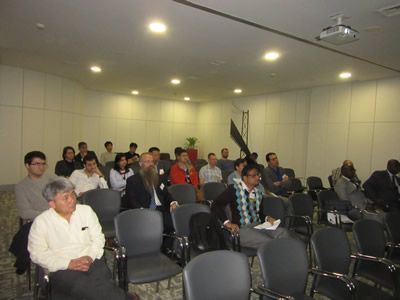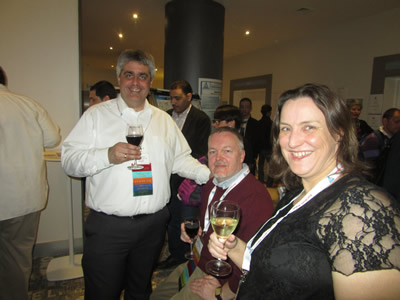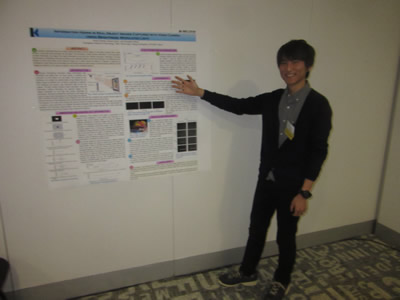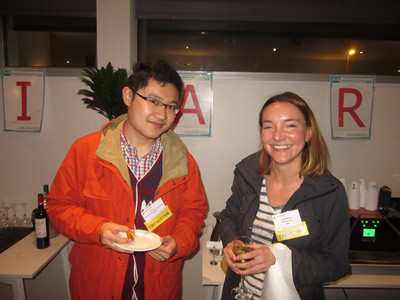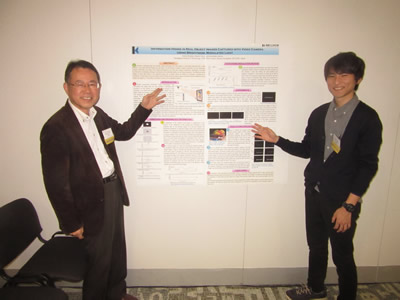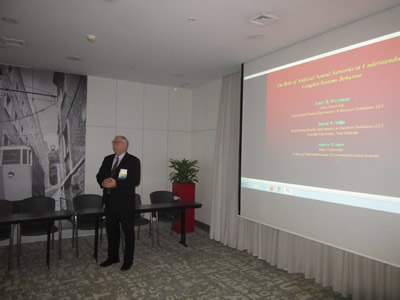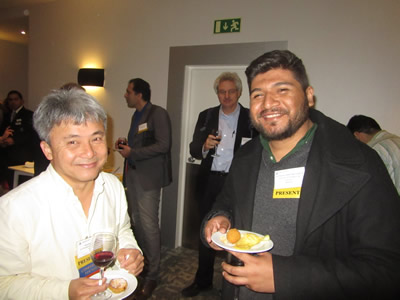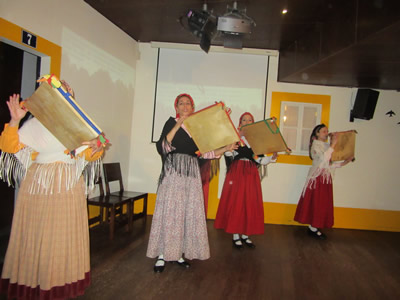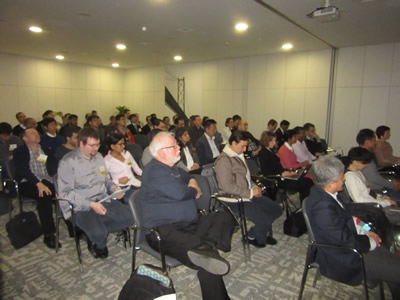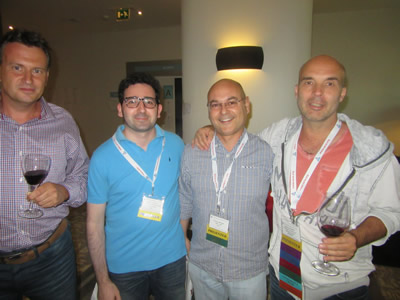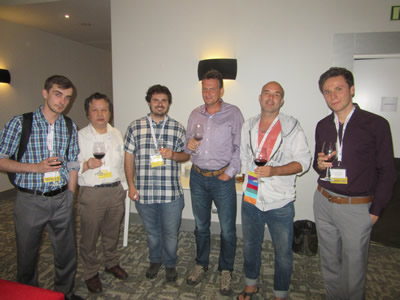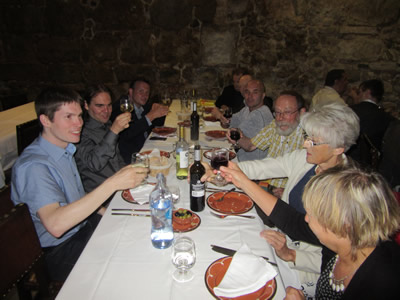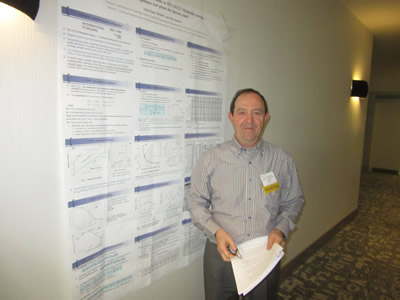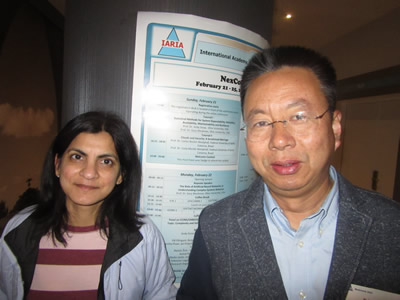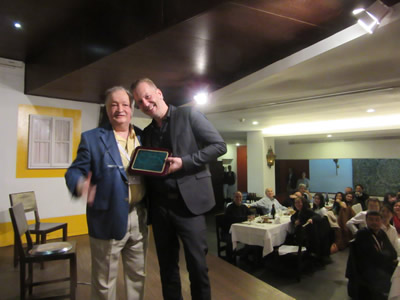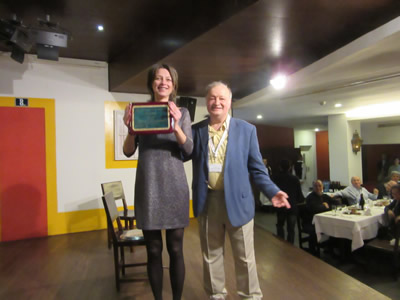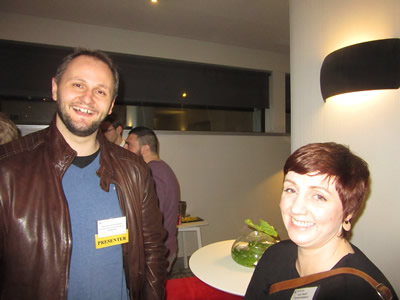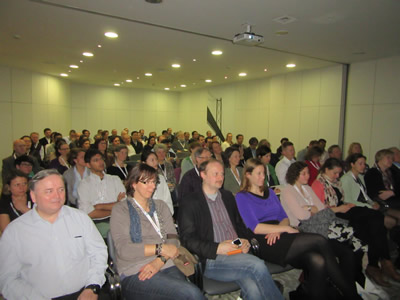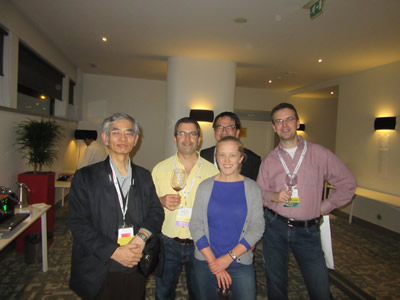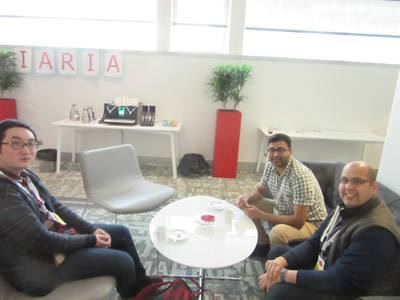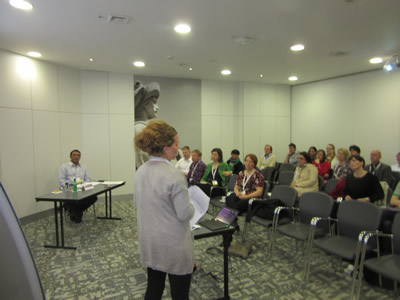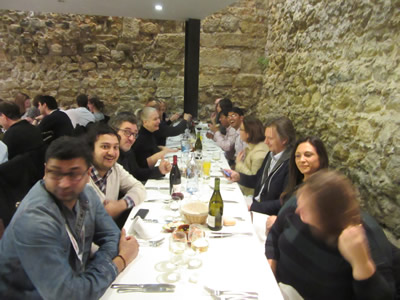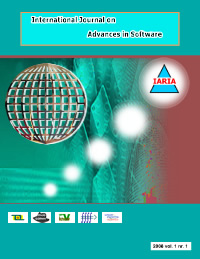DBKDA 2025 - The Seventeenth International Conference on Advances in Databases, Knowledge, and Data Applications
March 09, 2025 - March 13, 2025
DBKDA 2025: Call for Papers
Onsite and Online Options: In order to accommodate various situations, we are offering the option for either physical presence or virtual participation (pdf slides or pre-recorded videos).
Advances in different technologies and domains related to databases triggered substantial improvements for content processing, information indexing, and data, process and knowledge mining. The push came from Web services, artificial intelligence, and agent technologies, as well as from the generalization of the XML adoption.
High-speed communications and computations, large storage capacities, and load-balancing for distributed databases access allow new approaches for content processing with incomplete patterns, advanced ranking algorithms and advanced indexing methods.
Evolution on e-business, ehealth and telemedicine, bioinformatics, finance and marketing, geographical positioning systems put pressure on database communities to push the ‘de facto’ methods to support new requirements in terms of scalability, privacy, performance, indexing, and heterogeneity of both content and technology.
The Sixteenth International Conference on Advances in Databases, Knowledge, and Data Applications, DBKDA 2025, continues a series of international events covering a large spectrum of topics related to advances in fundamentals on databases, evolution of relation between databases and other domains, data base technologies and content processing, as well as specifics in applications domains databases.
We solicit both academic, research, and industrial contributions. We welcome technical papers presenting research and practical results, position papers addressing the pros and cons of specific proposals, such as those being discussed in the standard fora or in industry consortia, survey papers addressing the key problems and solutions on any of the above topics short papers on work in progress, and panel proposals.
Industrial presentations are not subject to the format and content constraints of regular submissions. We expect short and long presentations that express industrial position and status.
Tutorials on specific related topics and panels on challenging areas are encouraged.
The topics suggested by the conference can be discussed in term of concepts, state of the art, research, standards, implementations, running experiments, applications, and industrial case studies. Authors are invited to submit complete unpublished papers, which are not under review in any other conference or journal in the following, but not limited to, topic areas.
All topics and submission formats are open to both research and industry contributions.
DBKDA 2025 conference tracks:
Advances in fundamentals on databases
Foundations and architectures;
Design features (data quality, performance, robustness, scalability, security, privacy, parallel and distributed approaches, mobility, etc.);
Data quality, data structures, and data modeling;
Advanced indexing methods;
Advanced ranking algorithms and uncertainty;
Physical organization and performance;
Federated choreographies;
Temporal conformance;
Evolutionary clustering and dynamic hierarchical clustering
Knowledge Discovery and Machine Learning
Knowledge extraction via machine learning; Machine learning for datasets; Machine learning and graphs; Graphs analytics and deep learning; Machine learning models (supervised, unsupervised, reinforcement, constrained, etc.); Generative modeling (Gaussian, HMM, GAN, Bayesian networks, autoencoders, etc.); Bayesian learning models; Prediction uncertainty; Training of models (hyperparameter optimization, regularization, optimizers); Active learning (partially labels datasets, faulty labels, semi-supervised); Applications of machine learning (recommender systems, NLP, computer vision, etc.); Data in machine learning (no data, small data, big data, graph data, time series, sparse data, etc.).
NoSQL Databases
Key-value stores; Document stores; Wide-column stores; Graph databases; Spatial databases; Time-series databases; RDF stores; Hybrid DB management systems
Current ongoing researches
DBaaS Storage; Preference-driven databases; Personalized ranking models; Visual query systems; Reverse rank queries; Searching on process description graphs; Search over relational data streams; Linked data streams; Nearby coalescing; Automatic labelling; Personalized query expansion; Benchmarking replication; Community detection; Risk-adaptive security model; Faceted queries over ontologies; Inclusion dependencies; Periodic-frequent patterns; Dynamic query reordering; Queries for linked data; Footprint reduction; Multi-dimensional indexing; Set similarity join algorithms; Incremental continuous query processing; Linkset views; High-utility itemsets; Reputation estimation; Quality prediction; Approximate query answering; Hidden semantic data models; Temporal extractions; Target-oriented keyword search; Filter-based profile matching; Mutual information on data streams; Stream processing; Digitized documents streams; Queries with binary constraints; Propagation granularity; Processing over raw data; Lossy transformations; Queries on massive time series; Generalized indexing; Answering batch queries; Database task schedulers; Similarity search; Fuzzy object databases; Automated prediction of relationships; Linked data streams and Internet of things; Preferred repairs; Parallel-correctness and transferability; Guarded existential rules; Tree pattern containment; Large datasets; Accessing small data; Skyline queries; Distributed set-joins; Stream sampling; Dynamic graph streams; Dynamic data structures; Nearest neighbor search; Data lakes, Knowledge lakes
Databases and other domains
Leading-edge database technology and applications;
Heterogeneous databases interoperability and mediation;
Databases and Web services;
Databases and artificial intelligence;
Databases and agents;
Advances in database management systems;
Advanced transaction and workflow management;
Advances on XML and databases
Databases technologies
Self-managing databases; Mobile databases; Database access; Embedded databases;
Very large scale databases;
Spatial and spatio-temporal databases;
Data warehousing;
Multimedia databases;
Semantic databases;
Data integration resources on the Internet;
Object-oriented databases;
Web-based databases;
Deductive and active databases
Databases content processing
Contextual aggregated information retrieval; Aggregated query for workflows; Mining for complex data;
Mining for text, video, and pictures;
Knowledge discovery and classification;
Process mining;
Scalable data extraction;
Query processing and optimization;
Query rewrite rules;
Navigational path expressions;
Load-balancing in accessing distributed databases;
Incompleteness, inconsistency, uncertainty;
Storage and replication;
Patterns and similarities in data streams;
Fast matching;
Multiple views
Knowledge and decision bases
Knowledge representation and management; Knowledge discovery (business intelligence); Semantic information;
Ontology and advanced knowledge search;
Heuristics and meta-heuristics;
Intelligent knowledge querying;
Feature sampling and feature selection;
Context-aware knowledge base;
Blogs and social relationship search;
Deductive reasoning;
Reasoning databases;
Ontology-based reasoning; Knowledge graphs
Specifics on application domains databases
Database applications in Life Sciences; Advanced database applications;
Bioinformatics databases;
Healthcare databases;
Finance and marketing databases;
Telecom databases;
Geospatial databases;
Census databases;
Meteorological databases;
Business intelligence databases;
e-Business databases
XML-driven data, knowledge, databases
Data /dissemination, distributed, processing, management/; XML-data /storage, exchange, compress, metadata/; XML-data and metadata management; XML repositories; Knowledge discovery from XML repositories; XML-data processing /queries, indexing, management, retrieval, mining/; XML data and knowledge /representation, discovery, mining, orchestration/; XML-data in advances environments /clouds, P2P, multimedia, mobile, finance, biotechnologies, geospatial, space/; XML-data and process /data warehouse, workflow, web, learning, control/;
Data privacy
Privacy models; Privacy metrics; Privacy preservation; Watermarking; Data Hiding; Background knowledge; Privacy /data streams, social networks, databases, semantic web/; Privacy mechanisms /cryptography, privacy-aware access control, generalization-based algoritm, perturbation-based algorithm, preservation, sequental releases/; Practical studies /privacy leaking, privacy breach, threats to privacy, privacy in outsourcing/
Data quality and uncertainty
Models, frameworks, methodologies and metrics for data quality; Quality of complex data /documents, semi-structured data, XMLs, multimedia data, graphs, bio-sequences/; Uncertain and noisy data; Uncertain data representation; Processing uncertain data /querying, indexing, mining/; Mining uncertain data/probabilistic, spatially- and temporally- uncertain, uncertain streams/ Data lineage and provenance; Data profiling and measurement; Data integration, linkage and fusion; D uplicate detection and consistency checking; D ata mining and data quality assessment; Quality methods and algorithms / data transformation, reconciliation, consolidation, extraction, cleansing/; User perception on data quality and cleansing;
Data query, access, mining, and correlation
Data access technologies, Query optimisation, Discovering multi-modal correlations; Mining structural data from non-structural mixed-media documents; Data stream mining /frequent patterns, bursty event detection/; Profile mining; Corelation and anomaly in multi-modal-data /social networks, web traffic logs, sale transactions/; Information retrieval on a mixed collections; Multimedia data mining; Data mining system for medical multimedia data; Contents-based image/video retrieval systems
Data and process provenance
Provenance architectures and algorithms; Provenance modelling; Information management for provenance data; Provenance ontology and semantic; Provenance querying; Provenance annotation; Security, trust, and privacy for provenance information; Case studies and practice; Reasoning over provenance; Provenance analytics, mining and visualization
Data management
Distributed Query Languages; Query processing and optimization; Adaptive query processing; Management of mobile data; Managing data privacy and security; Data storage and management; Data stream systems; Data locating; Data warehouse management; Management of dynamic data; Workload adaptability; Transaction management; Performance evaluation and benchmarking or data management
Deadlines:
Submission | Nov 22, 2024 |
Notification | Jan 06, 2025 |
Registration | Jan 19, 2025 |
Camera ready | Feb 02, 2025 |
Deadlines differ for special tracks. Please consult the conference home page for special tracks Call for Papers (if any).
INSTRUCTION FOR THE AUTHORS
Authors of selected papers will be invited to submit extended versions to one of the IARIA Journals.
Publisher: XPS (Xpert Publishing Services)
Archived: ThinkMindTM Digital Library (free access)
Prints available at Curran Associates, Inc.
How to submit to appropriate indexes.
Only .pdf or .doc files will be accepted for paper submission. All received submissions will be acknowledged via an automated system.
Contribution types
- regular papers [in the proceedings, digital library]
- short papers (work in progress) [in the proceedings, digital library]
- ideas: two pages [in the proceedings, digital library]
- extended abstracts: two pages [in the proceedings, digital library]
- posters: two pages [in the proceedings, digital library]
- posters: slide only [slide-deck posted on www.iaria.org]
- presentations: slide only [slide-deck posted on www.iaria.org]
- demos: two pages [posted on www.iaria.org]
FORMATS
Only .pdf or .doc files will be accepted for paper submission. All received submissions will be acknowledged via an automated system.
Final author manuscripts will be 8.5" x 11", not exceeding 6 pages; max 4 extra pages allowed at additional cost.
Helpful information for paper formatting for MS Word can be found here.
There is a community provided LaTeX template: the CTAN package iaria (with full IARIA formatting rules, including IARIA citation style, but for providing citation style it is tightly bound to pdflatex+biblatex+biber). In addition, there is also iaria-lite (not bound to pdflatex+biblatex+biber, but compatible with any TeX stack; thus, it cannot provide the IARIA citation formattings, but only the titlepage and content-related IARIA formatting rules). Based on the iaria package, there is a minimal working example as Overleaf template. When you are using the LaTeX templates, please still adhere to the additional editorial rules.
Slides-based contributions can use the corporate/university format and style.
Your paper should also comply with the additional editorial rules.
Once you receive the notification of contribution acceptance, you will be provided by the publisher an online author kit with all the steps an author needs to follow to submit the final version. The author kits URL will be included in the letter of acceptance.
We would recommend that you should not use too many extra pages, even if you can afford the extra fees. No more than 2 contributions per event are recommended, as each contribution must be separately registered and paid for. At least one author of each accepted paper must register to ensure that the paper will be included in the conference proceedings and in the digital library, or posted on the www.iaria.org (for slide-based contributions).
CONTRIBUTION TYPE
Regular Papers (up to 6-10 page article -6 pages covered the by regular registration; max 4 extra pages allowed at additional cost- ) (oral presentation)
These contributions could be academic or industrial research, survey, white, implementation-oriented, architecture-oriented, white papers, etc. They will be included in the proceedings, posted in the free-access ThinkMind digital library and sent for indexing. Please submit the contributions following the instructions for the regular submissions using the "Submit a Paper" button and selecting the appropriate contribution type. 12-14 presentation slides are suggested.
Short papers (work in progress) (up to 4 pages long) (oral presentation)
Work-in-progress contributions are welcome. These contributions represent partial achievements of longer-term projects. They could be academic or industrial research, survey, white, implementation-oriented, architecture-oriented, white papers, etc. Please submit the contributions following the instructions for the regular submissions using the "Submit a Paper" button and selecting the contribution type as work in progress. Contributors must follow the conference deadlines, describing early research and novel skeleton ideas in the areas of the conference topics. The work will be published in the conference proceedings, posted in the free-access ThinkMind digital library and sent for indexing. For more details, see the Work in Progress explanation page. 12-14 presentation slides are suggested.
Ideas contributions (2 pages long) (oral presentation)
This category is dedicated to new ideas in their very early stage. Idea contributions are expression of yet to be developed approaches, with pros/cons, not yet consolidated. Ideas contributions are intended for a debate and audience feedback. Please submit the contributions following the instructions for the regular submissions using the "Submit a Paper" button and selecting the contribution type as Idea. Contributors must follow the conference deadlines, describing early research and novel skeleton ideas in the areas of the conference topics. The work will be published in the conference proceedings, posted in the free-access ThinkMind digital library and sent for indexing. For more details, see the Ideas explanation page. 12-14 presentation slides are suggested.
Extended abstracts (2 pages long) (oral presentation)
Extended abstracts summarize a long potential publication with noticeable results. It is intended for sharing yet to be written, or further on intended for a journal publication. Please submit the contributions following the instructions for the regular submissions using the "Submit a Paper" button and selecting the contribution type as Extended abstract. Contributors must follow the conference deadlines, describing early research and novel skeleton ideas in the areas of the conference topics. The work will be published in the conference proceedings, posted in the free-access ThinkMind digital library and sent for indexing. 12-14 presentation slides are suggested.
Posters (paper-based, two pages long) (oral presentation)
Posters are intended for ongoing research projects, concrete realizations, or industrial applications/projects presentations. The poster may be presented during sessions reserved for posters, or mixed with presentation of articles of similar topic. A two-page paper summarizes a presentation intended to be a POSTER. This allows an author to summarize a series of results and expose them via a big number of figures, graphics and tables. Please submit the contributions following the instructions for the regular submissions using the "Submit a Paper" button and selecting the contribution type as Poster Two Pages. Contributors must follow the conference deadlines, describing early research and novel skeleton ideas in the areas of the conference topics. The work will be published in the conference proceedings, posted in the free-access ThinkMind digital library and sent for indexing. 8-10 presentation slides are suggested. Also a big Poster is suitable, used for live discussions with the attendees, in addition to the oral presentation.
Posters (slide-based, only) (oral presentation)
Posters are intended for ongoing research projects, concrete realizations, or industrial applications/projects presentations. The poster may be presented during sessions reserved for posters, or mixed with presentation of articles of similar topic. The slides must have comprehensive comments. This type of contribution only requires a 8-10 slide-deck. Please submit the contributions following the instructions for the regular submissions using the "Submit a Paper" button and selecting the contribution type as Poster (slide-only). The slide-deck will be posted, post-event, on www.iaria.org.
8-10 presentation slides are suggested. Also a big Poster is suitable, used for live discussions with the attendees, additionally to the oral presentation.
Presentations (slide-based, only) (oral presentation)
These contributions represent technical marketing/industrial/business/positioning presentations. This type of contribution only requires a 12-14 slide-deck. Please submit the contributions following the submission instructions by using the "Submit a Paper" button and selecting the contribution type as Presentation (slide-only). The slide-deck will be posted, post-event, on www.iaria.org.
12-14 presentation slides are suggested.
Demos (two pages) [posted on www.iaria.org]
Demos represent special contributions where a tool, an implementation of an application, or a freshly implemented system is presented in its alfa/beta version. It might also be intended for thsoe new application to gather the attendee opinion. A two-page summary for a demo is intended to be. It would be scheduled in special time spots, to ensure a maximum attendance from the participants. Please submit the contributions following the submission instructions by using the "Submit a Paper" button and selecting the contribution type as Demos. The Demos paper will be posted, post-event, on www.iaria.org.
Tutorial proposals
Tutorials provide overviews of current high interest topics. Proposals should be for 2-3 hour long. Proposals must contain the title, the summary of the content, and the biography of the presenter(s). The tutorial slide decks will be posted on the IARIA site.
Please send your proposals to tutorial proposal
Panel proposals
The organizers encourage scientists and industry leaders to organize dedicated panels dealing with controversial and challenging topics and paradigms. Panel moderators are asked to identify their guests and manage that their appropriate talk supports timely reach our deadlines. Moderators must specifically submit an official proposal, indicating their background, panelist names, their affiliation, the topic of the panel, as well as short biographies. The panel slide deck will be posted on the IARIA site.
Please send your proposals to panel proposal


